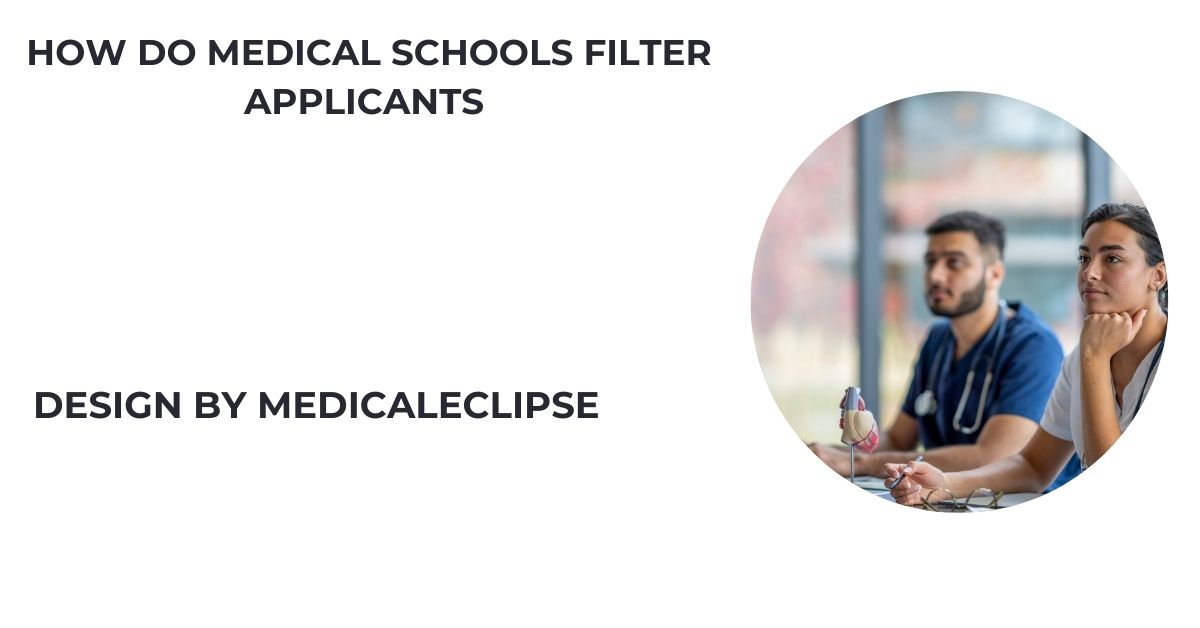Medical schools filter applicants based on GPA, MCAT scores, personal statements, recommendations, extracurriculars, and interviews. They also consider life experiences, diversity, and alignment with the school’s mission.
In this article, we will dive into the critical process of how medical schools filter applicants, exploring the factors that shape their selection criteria and how you can stand out in a competitive pool.
Academic Metrics:

One of the primary ways medical schools evaluate candidates is by reviewing academic performance. This includes:
GPA:
A high undergraduate GPA, especially in science courses, is often a prerequisite. Admissions committees look for consistency and upward trends in academic performance. They focus on academic rigor and how well applicants handle challenging coursework.
A strong GPA demonstrates dedication and the ability to succeed in a demanding environment. Additionally, schools may place extra emphasis on the science GPA, as it reflects readiness for medical school’s rigorous scientific curriculum.
MCAT Scores:
The Medical College Admission Test (MCAT) is a standardized exam that evaluates knowledge in areas such as biology, chemistry, physics, and critical thinking. Competitive scores are a significant factor in the initial filtering process. High MCAT scores show applicants’ ability to grasp complex scientific concepts, which are crucial for medical school success.
Admissions committees also use MCAT scores as a benchmark to compare candidates across various schools. A strong performance can help offset any weaknesses in other areas of the application.
Also Read: What Does New York Medical College Look For In Applicants – NYMC Applicant Criteria!
Personal Statement:
The personal statement is an applicant’s opportunity to showcase their motivation for pursuing medicine. Medical schools use this essay to assess:
- Genuine passion for the field.
- Unique experiences that influenced the decision to become a physician.
- Communication skills and ability to articulate goals.
Letters of Recommendation:

Strong letters from professors, mentors, or healthcare professionals provide insight into an applicant’s character, work ethic, and suitability for medical school. Schools often prioritize letters from individuals who:
- Supervised the applicant in academic or clinical settings.
- Can attest to their problem-solving abilities and professionalism.
Extracurricular Activities:
Applicants are expected to demonstrate a commitment to medicine and the community through:
Clinical Experience:
Shadowing physicians, volunteering in hospitals, or working in healthcare settings provides valuable exposure to the medical field. These experiences allow applicants to understand the day-to-day responsibilities of doctors and the healthcare environment. Medical schools value firsthand experience as it demonstrates commitment and insight into patient care. It also helps applicants develop empathy, communication skills, and a deeper understanding of the challenges in the medical profession.
Research:
Participation in scientific studies or publications highlights analytical skills and curiosity, which are essential for medical practice. Research experience showcases an applicant’s ability to think critically, solve complex problems, and contribute to advancements in medical knowledge. Schools value applicants who can demonstrate their involvement in research projects, as it indicates a capacity for independent thinking and scientific inquiry. Additionally, research experience can indicate a future interest in medical innovation or academia.
Community Service:
Volunteer activities show a dedication to helping others and align with the core values of medicine. Community service highlights compassion, leadership, and a willingness to serve underserved populations. It also demonstrates that applicants are well-rounded individuals who understand the importance of social responsibility in healthcare. Medical schools seek applicants who are committed to improving public health and can contribute to their mission of serving diverse communities.
Also read: How PRP Therapy Helps Heal Injuries Naturally
Secondary Applications:
Many medical schools require a secondary application, which includes additional essays tailored to the school’s mission. These essays often address:
- How the applicant’s goals align with the school’s values.
- Diversity and unique perspectives the candidate brings.
- Specific interests in research, rural health, or underserved populations.
Interviews:

After initial screening, selected candidates are invited for interviews. These interviews allow schools to assess:
- Interpersonal skills and professionalism.
- Ethical reasoning and problem-solving abilities.
- Compatibility with the school’s culture and mission.
Holistic Review Process:
Increasingly, medical schools adopt a holistic approach to admissions, considering:
Life Experiences:
Overcoming adversity, leadership roles, or unique backgrounds can significantly enhance an applicant’s profile. Medical schools value applicants who have faced and triumphed over personal challenges, as these experiences demonstrate resilience and determination. Leadership roles, whether in academics, extracurriculars, or work, show the ability to manage responsibilities and inspire others. Unique backgrounds, such as overcoming socioeconomic challenges or having multicultural experiences, bring a fresh perspective that can contribute to the diversity of the medical community.
Diversity:
Contributions to a diverse and inclusive medical community are increasingly prioritized in admissions. Medical schools seek applicants who can bring a range of perspectives, experiences, and cultural understanding to enhance patient care and teamwork. Diversity isn’t only about ethnicity but also includes socioeconomic background, geographic location, and life experiences. Schools recognize that a diverse student body leads to better healthcare solutions by addressing the varied needs of patients from different walks of life.
Non-Traditional Applicants:
Career changers or those with unique pathways to medicine are often valued for their diverse perspectives and experiences. These applicants may bring skills and insights from previous careers that enhance their medical practice. Non-traditional applicants often have more life experience, which can contribute to better patient interactions and problem-solving abilities. Medical schools appreciate applicants with unique pathways, as they demonstrate passion, commitment, and the ability to adapt to new challenges.
Also Read: Medical Transcription Jobs – Which Is Better!
Automated Filtering Systems:
With the volume of applications, some schools use software to filter applicants based on predefined criteria, such as GPA and MCAT scores. However, these systems are usually the first step and do not replace human review.
Red Flags:
Admissions committees also watch for potential issues, including:
- Academic dishonesty or professionalism concerns.
- Gaps in education or inconsistent performance without explanation.
- Generic or poorly written application materials.
Fit with the School’s Mission:
Finally, medical schools prioritize candidates whose goals align with their mission. For example:
- Schools with a focus on rural health may prioritize applicants from rural areas or with experience in underserved communities.
- Research-intensive programs may favor applicants with significant research experience.
FAQ’s
1. What academic factors do medical schools prioritize?
Medical schools focus on a high GPA, particularly in science courses, and competitive MCAT scores to assess academic readiness.
2. How important is the personal statement in the application?
The personal statement is essential for demonstrating passion, motivation, and unique experiences that drive the decision to pursue medicine.
3. What extracurricular activities are considered valuable?
Clinical experience, research, and community service show commitment to medicine and help develop essential skills like empathy and problem-solving.
4. What role do interviews play in the selection process?
Interviews assess interpersonal skills, professionalism, ethical reasoning, and alignment with the school’s culture and mission.
5. How do life experiences and diversity impact the application?
Life experiences, such as overcoming adversity, and contributions to diversity help applicants stand out by bringing unique perspectives and enhancing patient care.
Conclusion
Medical schools use a comprehensive and rigorous process to filter applicants, balancing academic excellence with personal qualities, life experiences, and alignment with their mission. Understanding these factors can help prospective students prepare a competitive application that stands out in a crowded field. By excelling in academics, showcasing meaningful experiences, and articulating clear goals, applicants can increase their chances of gaining admission to medical school.

Leave a Reply